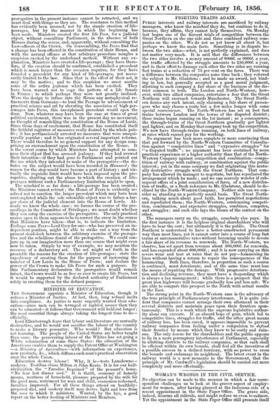FIGHTING TRAINS AGAIN.
Puaxic interests and railway interests are sacrificed by railway managers, who know the mischief they do, but continue to do it, because, ihey affirm, they cannot help themselves. On Monday last began one of the fiercest trials of competition between the Great Northern on the one side and three combined railway com- panies on the other. We do not as yet know all about it, but perhaps we know the main facts. Something is in dispute be- tween the two sides—what, is not perfectly explained, and does not matter very much. It is said that the differences between the two sides involve a money amount of 80001. or 90001. a year, the traffic affected by thestruggle amounts to 250,0001. a year, and in their effort to damage each other the two sides are running fast trains at a reduction of 75 per cent on the fares. There was a difference between the companies some time back ; they referred the subject to Mr. Gladstone ; and he made an award, not bind- ing in law, but generally accepted as a good moral judgment, allotting to each company a fair share of the business of the dis- trict common to both. The London and North-Western, how- ever, with two allied companies, entertains a fear that the Great Northern will encroach towards Manchester. The Great North- ern denies any such intent, only claiming a fair share of passen- gers who may choose a route but a few miles longer with some special convenience. The North-Western has set on foot fast trains between London and the towns of the disputed district ; those trains began running on the 1st instant ; as a consequence, the through-trains of the Great Northern gradually got lighter and lighter, and on Monday that company took up the competition. We now have through-trains running, on both lines of railway, at rates which cannot pay for the working.
No argument has been more complete or more convincing than that put forward by the North-Western Committee of Consulta- tion against " competitive lines " and " expensive struggles " for " a disputed traffic ' ; no argument has been sustained by more practical experience or a higher authority than that of the North- Western Company against competition and combination—compe- tition of railway with railway, or combination against the public interest ; yet in the same company we find originating this mutu- ally destructive struggle with the Great Northern. That com- pany has allowed its manager to negotiate, but has repudiated the arrangement which he made ; and we can seemly wonder if sub- sequent offers of a joint consideration of fares, of a new distribu- tion of traffic, or a fresh reference to Mr. Gladstone, should be de- clined by the North-Western Company. Neither side can we con- sider as standing on a perfectly sound basis. The Great North- ern, talking much about good faith, has permitted negotiations and repudiated them ; the North-Western, condemning competi- tion, combination, and expensive struggles, combines, competes, and struggles ; and each side lays the blame of the contest on the other.
The managers carry on the struggle, somebody else pays. In the first instance it is the helpless original shareholders who will have to bear the cost ; but ultimately it is the public. The Great Northern is understood to have a better-constructed permanent way than most lines, yet it cannot enter into a course of long fast trains at unremunerative rates without becoming unable to devote a fair share of its revenue to renewals. The North-Western, we observe, has set apart from revenue about 300,0001. for renewals, and has expended. about 600,0001. ' • and it is now carrying on this severe wear and tear at rates that do not pay—hammering its lines without having a return to repair the consequences of the hammering. Both lines, therefore, in proportion as such a course is continued, must deteriorate, and at the same time must lose the means of repairing the damage. With progressive deteriora- tion and declining revenue, they must have a desponding which is always a lax management ; while there is a prospect that the great iron highways will become gradually less and less safe. We are able to compare this prospect to the North with actual results in the East.
The strong point in the North-Western case is the advocacy of the true principle of Parliamentary interference. It is quite evi- dent that companies cannot arrange their own allotment in their several districts and maintain peace upon their frontiers spon- taneously. This is a work which the supreme legislative author- ity alone can execute. If an absurd hope of gain, which led to competitive lines, struggles for traffic, and the other great means of railway loss, has been cured, it appears impossible to prevent railway companies from feeling under a compulsion to defend their frontier by means which they know to be costly and ruin- ous. The only rescue for the shareholders and the public appears to lie in a more peremptory interference of Parliament, especially in allotting districts to the railway companies, so that each shall be efficient within its own bounds, shall feel all the incentives of a possible success in a defined territory, with no power to oross the bounds and endamage its neighbour. The latest event in the railway world is a new memento to the Government, that the principle of Mr. Cardwell's legislation should be carried out more completely and more effectually.


























 Previous page
Previous page